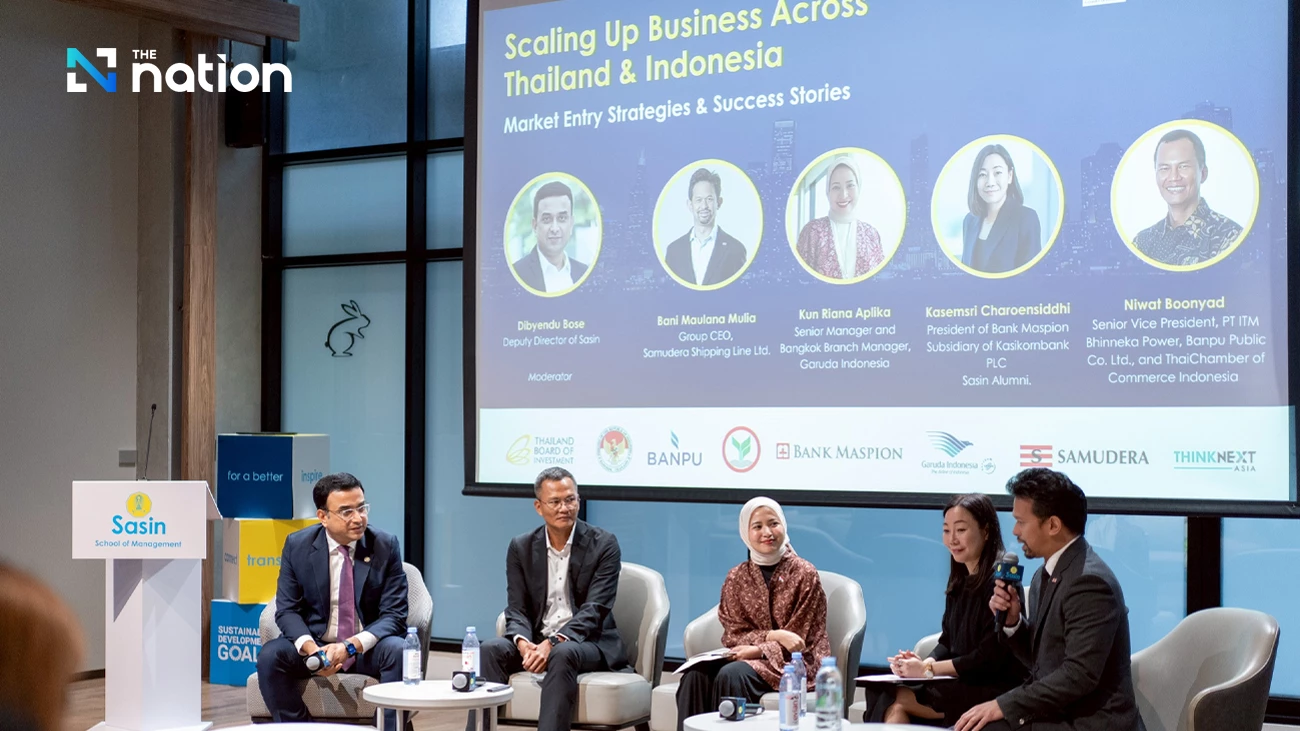
The modern world is driven by unpredictable changes induced by political uncertainty, economic recessions, and rapid artificial intelligence (AI) advancement, several experts said in an executive forum.
On Thursday, Sasin School of Management, in partnership with the Indonesia-Thai Chamber of Commerce (INTCC), hosted an executive forum, Scaling Up Business Across Thailand & Indonesia: Market Entry Strategies & Success Stories.
“92% of companies have planned to increase their investment in AI,” said Rachada Apiromdej, founder and CEO of THINK NEXT ASIA. She noted that 70% of Asia Pacific consumers already think that in less than 10 years time, relationship between AI and human will be as rewarding as relationship.
She added that Generation Beta, born this year, will work in jobs that didn't exist before, such as space architects.
 Rachada Apiromdej, founder and CEO of THINK NEXT ASIA
Rachada Apiromdej, founder and CEO of THINK NEXT ASIA
Due to unpredictability, Rachada said companies have to adapt to overcome challenges and turn them into opportunities, highlighting 'Mirror, Mirror' and 'Heritage Renewed' as recent trends that win consumers' hearts.
Among the 'Mirror, Mirror' examples Rachada presented, ING Bank developed an AI-powered application to help users start thinking about their financial future. Generative AI creates an image that allows people to visualise what they want their future to look like.
Brands with optimised local profiles are 138% more likely to achieve top rankings, higher star ratings, and greater engagement rates, she noted.
She further explained that the 'Heritage Renewed' trend is driven by people's reflection on the past—whether in fashion, music, or cultural traditions. Among the examples, she highlighted “Black Myth: Wukong,” a video game inspired by the 16th-century Chinese novel Journey to the West.
The game has become the second most played title on the Steam platform. Deeply rooted in Chinese mythology, it introduced global audiences to the richness of Chinese culture. She added that it even boosted tourism to sites featured in the game by 300%.
“In every crisis there is opportunity. So let's embrace the new way of seeing our future and let's you have a wonderful together,” Rachada concluded.
No change, no growth – challenges in business expansion
Bani Maulana Mulia, group CEO of Indonesia-based shipping company Samudera Shipping Line, stated that the unpredictable change over the past 20 years motivated the company’s international expansion with continuous adaptation, particularly global trade volatility, political uncertainties and supply chain disruptions.
He also quoted that for Samudera, improvement is not optional; it is a matter of survival.
“We, as an Indonesian private sector company, we cannot afford to only wait until when it's the right time, the best time for an investment in very conducive perspective,” he said.
Given that Thailand is currently far more advanced than Indonesia, Mulia emphasised that this factor has driven the company to expand into other countries and gain experience in competing within those markets.
Overcoming regulatory barriers
Kasemsri Charoensiddhi, President of Bank Maspion (a subsidiary of Kasikorn Bank), shared that even established brands have to rebuild trust in new markets. In entering Indonesia, the bank first relied on existing Thai investor linkage before adapting its services to meet local customers.
“For us I think Kasikorn Bank always a very good student we have to always supply the regulation. So, that's why today how we get through those. So, I think we just have to follow the rules and also utilize the the local on team to support on this,” she said.
She noted that the key of building credibility and growth is understanding the behaviour of customers.
Kun Riana Aplika, senior manager and Bangkok branch manager of Garuda Indonesia, explained that foreign legal and regulatory frameworks posed challenges to the airline’s operations.
"We continuously expand our network both domestically and internationally. However, we face many regulatory challenges, as we come from a developing country with outdated regulations," she explained.
To address these challenges, she said, Garuda Indonesia has undertaken thorough cultural sensitivity measures to align its products and services with local consumer preferences.
Things constantly evolve and change, but this is what the airline must do to meet international standards while ensuring the safety, security and comfort of passengers, she said.

Turning challenges into opportunities
Niwat Boonyad, senior vice president of PT ITM Bhinneka Power, Banpu, highlighted that local market research can reveal hidden opportunities. Banpu strategically shifted from coal mining to be successful in renewable energy by studying Indonesia’s demographics, energy resources, and infrastructure.
As digital transformation. Companies have to move toward digital platforms to improve accessibility and be competitive. Niwat said Banpu’s pivot to clean energy also demonstrates alignment with the global sustainability trend.
Collaboration with local partners is helping to get insightful information that supports smooth operations amid unpredictability.
"This is both a great opportunity and a significant challenge for us, as we need to adjust not only our strategy but also restructure our team," he said, "Despite the difficulties, we see this as one of our biggest opportunities."
Mulia highlighted the importance of human resource development, including leadership training, and creating international exposure. He urged companies to empower the new generation, ensuring they are well-equipped to adapt, innovate and thrive in an unpredictable world.
“If we have not been disrupted, if we keep on doing things the way we have been doing, then we will not be changing fast enough,” he said, “The disruptions will force us to change faster, and we will need to adapt faster.”


